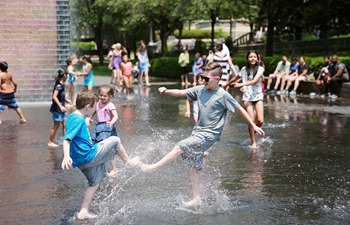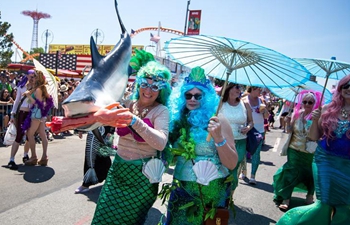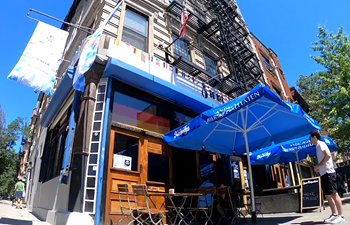NEW YORK, June 17 (Xinhua) -- A famed restaurant in New York City turned itself into a workshop over the weekend for learning to make rice dumplings to celebrate the Dragon Boat Festival, a traditional Chinese holiday that commemorates the death of an ancient patriotic poet Qu Yuan.
Over a hundred people enjoyed the two-day classes during which master chefs showcased them skills of hand wrapping rice dumplings of different shapes and fillings at Jasmine, a Chinese restaurant popular with U.N. diplomats in Midtown Manhattan, on Saturday and Sunday.
The rice dumpling, called Zongzi in Chinese, is a centerpiece of the Dragon Boat Festival, or Duanwu Festival, which falls on the 5th day of the fifth lunar month (June 18 this year).
"My daughter loves cooking, and I wanted to take this chance to introduce her to the traditional Chinese culture, which I myself didn't know much about either," said Yan Shao, who brought her U.S.-born daughter to the event, in an interview with Xinhua.
The participants including the Shao's were instructed step by step to make a Zongzi on their own, choosing two or three pieces of bamboo leaves, adding fillings like sticky rice, a blob of taro or red bean, then wrapping it up into a triangular pyramid delicacy.
"It's honestly harder than we thought," said Annie Lin, a Chinese college student studying at Columbia University, struggling to wrap the string around her dumpling.
It was Jasmine's second time to offer locals such classes since its opening in 2016, with an aim to bring the authentic Chinese flavor to New York, according to Zuqi Su, co-owner of the restaurant.
"'A lonely stranger in a strange land I am cast, I miss my family all the more on every festival day,' " said Su, quoting a Tang dynasty Chinese poet Wang Wei (699-759). "On a festival like this, we want to help with the homesickness of Chinese living abroad, and introduce traditional Chinese culture to people here."
"I enjoy this so much," said Austrian Thomas Hasler."I eat out a lot at Chinese restaurants, but being able to make something has been so much more fun."
Anirudh Singh, another participant, was able to recount the origin of the Dragon Boat Festival. "The fishermen threw rice in the river to make sure the fish didn't eat Qu Yuan's body, right?" He said. "I learnt all about it before I came here."
Singh was quite right. The festival began in China's Spring and Autumn (770-476 B.C) and Warring States periods (475-221 B.C). Qu Yuan was a minister of Chu, located in the Yangzi River area of central China.
In 340 BC, Qu was facing the pain of losing his homeland. Later he drowned himself in the Miluo River on May 5. The people of Chu were very sad.
To prevent fish from eating his body, the locals wrapped leaves around rice and put them into the river while beating their drums and splashed their paddles on boats.
Jasmine's event also featured a recitation of an extract of Qu's famous poem Li Sao, or The Sorrow of Parting, by a guest from the New York Hanfu Corporation in traditional Chinese costume.
With 373 lines and more than 2,400 characters, "Li Sao" is also one of the longest poems of ancient China. In making use of a wide range of metaphors derived from local culture, the poem expresses Qu's unrequited love for his country Chu, and his sadness over its inevitable decline.













